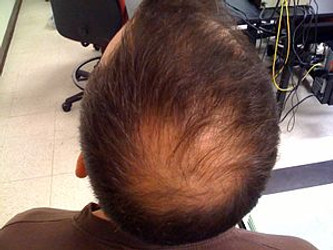UNDERSTANDING ANDROGENETIC ALOPECIA
Posted by Manny Y on 8th Apr 2015
Everyone will experience some form of hair loss in their life time.Depending on one’s condition or situation, we sometimes experience increased hair fall that may be quite alarming and can lead us to worry if this may lead to total hair loss. Thankfully, most causes of hair loss are temporary or self limiting.
Probably the mostdreadful cause of hair loss is androgenetic alopecia, the industry slow, but progressive type of hair loss that could lead to total baldness in men. The reason why androgenetic alopecia is so dreadful that is also affects women and can occur at any age. Young individual or even teenagers can suffering from this type of hair loss.

Androgenetic alopecia or male/female hair loss is hereditary which causes the hair follicles to become sensitive to a hormone called DHT or dihydrotestosterone. This is predominately male hormone naturally produced in the body. Incredibly, women also produce small amounts of this hormone, hence their hair loss.
Analystsdiscovered that DHT causes the scalp to harden or stiffen, reducing the blood vessels leading to the hair follicles. Thisdiminishesblood flow to the scalp, this means reduced oxygenation and nourishment to the hair follicles. This causes the follicles to weaken and shrink, producing weak and thin hair. Over time, hair produced the follicles become tinnier and thinner until it can no more produce terminal hair and what is left are very thin, transparent hair called fuzz or peach hair.
The only way to stop androgenetic alopecia is to stop the hormone causing it. Inhibiting the formation DHT is the only way to cut off its stiffening effect of the scalp, therefore, reopening the flow of blood to the follicles. This hair follicle rejuvenation stimulates new hair growth and stops further hair fall.
There are a lot of hair loss treatment products available to inhibit DHT. Basically there are oral and topical medications. There have been a lot of controversies on the use of oral DHT inhibitors due to its serious side effects. Topical treatments on the other hand are much, much safer since the product is only applied on the scalp and its inhibitory effects are active locally.

